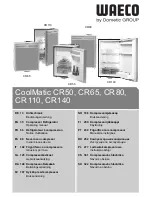
9 Noises and alarms
9
Noises and alarms
9.1
Operating noise
The appliance can make various noises during operation. Although the appliance is
noise-optimized, some noise cannot be eliminated completely. This noise depends on
the size of the appliance, how it is installed and the cooling requirements (e.g. fast cool-
ing), the ambient temperature and the installation conditions. Operating noises are partic-
ularly audible immediately after switching on the compressor; however, these noises be-
come quieter as the appliance runs.
Unusual noises are often caused by improper installation. The appliance must be in-
stalled on a level and stable surface. In open kitchens or in the case of appliances in-
stalled in partitioned areas, normal operating noises may seem louder. This is not a fault
but rather an effect of the design/architecture.
Noise
Cause
Remark
Buzzing
Compressor/fan
Normal operating noise made by the cooling
unit.
Gurgling, bub-
bling, hissing
Cooling circuit
Normal operating noise as refrigerant flows
through the cooling circuit.
Hissing
Cooling circuit
Normal operating noise as refrigerant is injec-
ted into the evaporator.
Rattling
Glass shelves, baskets,
door trays, contents, etc.
Arrange the parts in the interior so that they
are fixed in place and not touching.
Creaking
Housing
Normal, temperature-dependent stress-strain
of the materials, e.g. plastics, insulation.
9.2
Warning and alarm signals
Warnings when the appliance doors are open
If the cooling compartment door is open for several minutes, the following alarm signals
occur:
Time
Alarm signals
After 2 minutes
LEDs flash every 15 seconds.
After 3 minutes
LEDs flash every 5 seconds.
After 4 minutes
LEDs flash rhythmically every second.
After 10 minutes
An acoustic alarm sounds for 3 minutes. The acoustic alarm repeats
every 30 minutes.
Temperature alarm
An acoustic signal sounds if the cooling compartment temperature rises 10 °C above
the selected temperature value.
19










































